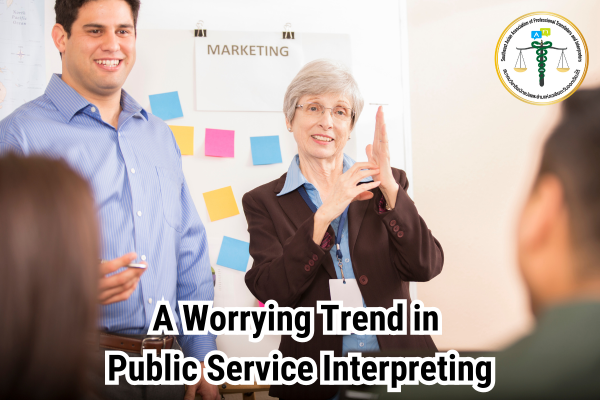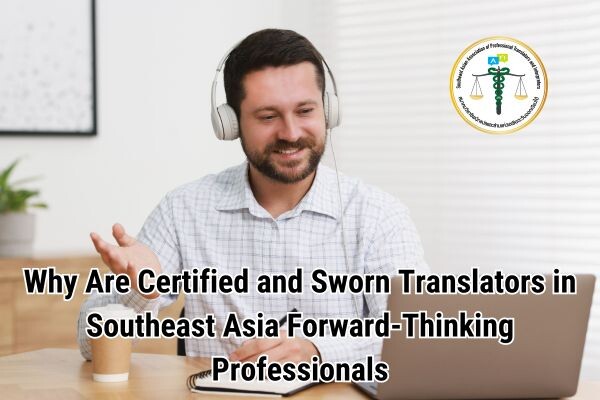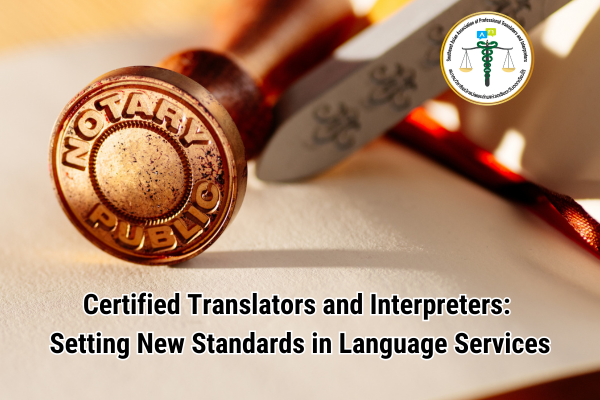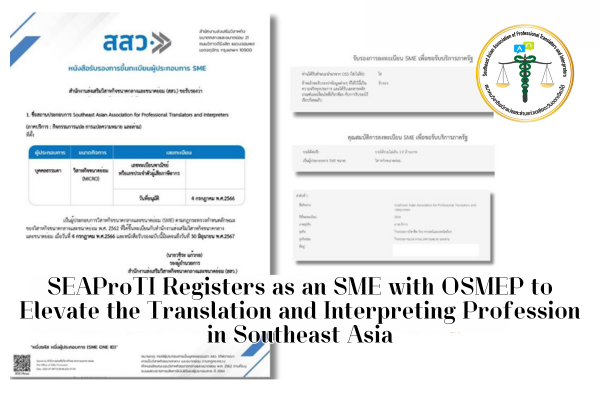Underqualified and Underpaid:
A Worrying Trend in Public Service Interpreting
6 January 2025, Bangkok – Public service interpreting is a cornerstone of communication in diverse societies. It ensures that individuals who do not speak the primary language of the country can access critical services such as healthcare, legal aid, and immigration support. However, a troubling trend is emerging: the employment of underqualified interpreters at exploitative pay rates. This issue undermines the quality of interpretation, jeopardizes the rights of vulnerable individuals, and wastes public funds. In this article, we will explore the root causes, consequences, and potential solutions to this growing problem.
The Role of Public Service Interpreting
Public service interpreters facilitate communication between government services and non-native speakers. These interpreters play a crucial role in sectors such as:
-
Healthcare: Ensuring accurate communication between medical professionals and patients.
-
Legal Services: Providing linguistic support in courtrooms and police stations.
-
Immigration: Assisting individuals in navigating complex visa and asylum processes.
-
Social Services: Helping vulnerable individuals access the support they need.
In these settings, accuracy, neutrality, and professionalism are non-negotiable. Misinterpretation can lead to life-altering consequences, such as wrongful legal outcomes, medical errors, or the denial of essential services.
The Growing Problem: Underqualified Interpreters
A recent review of job postings by interpreting agencies reveals alarming trends. Many agencies list minimal qualifications for interpreters, such as:
-
Fluency in two languages (without professional certification).
-
Basic listening and note-taking skills.
-
A high school diploma or equivalent.
These requirements fall far short of the professional standards needed for public service interpreting. Certified interpreters undergo rigorous training in areas like legal terminology, cultural competency, and ethics. When agencies hire underqualified individuals, it compromises the quality of interpretation and risks the well-being of service recipients.
Exploitation Through Low Pay
Another critical issue is the exploitative pay rates offered to interpreters. In some cases, agencies advertise hourly rates as low as €6 (approximately £5.20). This rate:
-
Falls below the minimum wage in many jurisdictions.
-
Disregards the complexity and responsibility of interpreting work.
-
Forces interpreters to work excessive hours or take multiple jobs to make ends meet.
Low pay not only devalues the profession but also discourages talented individuals from pursuing careers in interpreting. This creates a cycle of underqualification and low quality in public service interpreting.
Consequences of the Current Practices
The employment of underqualified and underpaid interpreters has far-reaching consequences:
1. Compromised Service Quality
Inaccurate interpretation can result in:
-
Misdiagnoses in medical settings.
-
Miscommunication of legal rights, leading to unjust outcomes.
-
Incorrect immigration decisions, affecting individuals’ futures.
2. Ethical Concerns
Public service interpreting requires adherence to strict ethical standards, including neutrality and confidentiality. Undertrained interpreters may lack the awareness or ability to uphold these principles.
3. Financial Inefficiency
While low pay may appear to save costs, it often results in:
-
Increased spending on correcting errors.
-
Higher reliance on welfare benefits by underpaid interpreters.
-
Legal liabilities arising from misinterpretation.
4. Erosion of Trust
When public services fail to provide high-quality interpreting, it undermines trust in government institutions. Non-native speakers may hesitate to seek help, exacerbating social inequalities.
Root Causes of the Problem
1. Outsourcing to Cost-Cutting Agencies
Public institutions often outsource interpreting services to agencies that prioritize cost reduction over quality. These agencies may:
-
Hire interpreters without professional certifications.
-
Offer rates that attract underqualified candidates.
-
Lack accountability mechanisms for quality assurance.
2. Lack of Regulation
Unlike some professions, interpreting is not universally regulated. Inconsistent standards across agencies and countries allow for exploitative practices.
3. Limited Awareness
Public service officials and policymakers may lack understanding of the skills and training required for effective interpreting. This can lead to poor procurement decisions.
Proposed Solutions
1. Establish Minimum Qualifications
Governments and public institutions should require interpreters to hold recognized professional certifications, such as:
-
A diploma in public service interpreting.
-
Membership in professional associations.
-
Certification from accredited bodies.
2. Implement Fair Pay Policies
Agencies and institutions must adopt fair pay practices, aligned with the complexity and importance of interpreting work. For example:
-
Set minimum pay rates based on local living wages.
-
Provide additional compensation for specialized assignments.
3. Promote Professional Recognition
Interpreting should be recognized as a regulated profession, similar to law or medicine. This includes:
-
Licensing requirements for interpreters.
-
Continuous professional development.
-
Ethical guidelines enforced by oversight bodies.
4. Increase Transparency in Outsourcing
Public institutions should:
-
Publish criteria for selecting interpreting agencies.
-
Monitor and report on the quality of outsourced services.
-
Prioritize agencies that adhere to ethical and professional standards.
How You Can Help
If you are concerned about the state of public service interpreting, here are some ways to get involved:
-
Raise Awareness: Share information about the importance of qualified interpreters.
-
Advocate for Change: Support campaigns for better pay and regulation in the interpreting profession.
-
Report Exploitation: Highlight unethical practices to professional associations and oversight bodies.
Conclusion
The trend of underqualified and underpaid interpreters in public services is a pressing issue that demands immediate attention. Ensuring access to qualified interpreters is not just a matter of professional standards but a commitment to justice, equity, and human rights. By holding public institutions accountable and advocating for fair practices, we can protect the integrity of public service interpreting and the communities it serves.
About SEAProTI’s certified translators, translation certification providers, and certified interpreters:
The Southeast Asian Association of Professional Translators and Interpreters (SEAProTI) has officially announced the criteria and qualifications for individuals to register as “Certified Translators,” “Translation Certification Providers,” and “Certified Interpreters” under the association’s regulations. These guidelines are detailed in Sections 9 and 10 of the Royal Thai Government Gazette, issued by the Secretariat of the Cabinet under the Office of the Prime Minister of the Kingdom of Thailand, dated July 25, 2024, Volume 141, Part 66 Ng, Page 100.
To read the full publication, visit: the Royal Thai Government Gazette
ล่ามบริการสาธารณะที่ขาดคุณสมบัติและถูกจ้างในอัตราค่าจ้างต่ำ: แนวโน้มที่น่ากังวล
6 มกราคม 2568, กรุงเทพมหานคร – ล่ามบริการสาธารณะเป็นเสาหลักของการสื่อสารในสังคมที่มีความหลากหลาย ช่วยให้บุคคลที่ไม่พูดภาษาหลักสามารถเข้าถึงบริการสำคัญ เช่น การดูแลสุขภาพ ความช่วยเหลือทางกฎหมาย และบริการด้านการตรวจคนเข้าเมือง อย่างไรก็ตาม ปรากฏการณ์ที่น่ากังวลกำลังเกิดขึ้น คือ การว่าจ้างล่ามที่ขาดคุณสมบัติและจ่ายค่าจ้างในอัตราที่เอาเปรียบ ปัญหานี้บั่นทอนคุณภาพของการแปล เสี่ยงต่อสิทธิของบุคคลที่เปราะบาง และสิ้นเปลืองงบประมาณของภาครัฐ บทความนี้จะสำรวจสาเหตุ ผลกระทบ และแนวทางแก้ไขปัญหาที่กำลังขยายตัวนี้
บทบาทของล่ามบริการสาธารณะ
ล่ามบริการสาธารณะทำหน้าที่เป็นตัวกลางในการสื่อสารระหว่างบริการของรัฐกับบุคคลที่ไม่ใช้ภาษาแม่ของประเทศ ล่ามเหล่านี้มีบทบาทสำคัญในภาคส่วนต่าง ๆ เช่น:
-
การดูแลสุขภาพ: เพื่อให้การสื่อสารระหว่างบุคลากรทางการแพทย์และผู้ป่วยเป็นไปอย่างถูกต้อง
-
บริการทางกฎหมาย: ให้การสนับสนุนด้านภาษาศาสตร์ในห้องพิจารณาคดีและสถานีตำรวจ
-
การตรวจคนเข้าเมือง: ช่วยบุคคลจัดการกับกระบวนการขอวีซ่าหรือสถานภาพผู้ลี้ภัย
-
บริการสังคม: ช่วยให้บุคคลที่เปราะบางสามารถเข้าถึงความช่วยเหลือที่จำเป็น
ในบริบทเหล่านี้ ความแม่นยำ ความเป็นกลาง และความเป็นมืออาชีพเป็นสิ่งที่ขาดไม่ได้ การตีความผิดพลาดอาจนำไปสู่ผลกระทบที่เปลี่ยนแปลงชีวิต เช่น การวินิจฉัยที่ผิดพลาด ผลลัพธ์ทางกฎหมายที่ไม่เป็นธรรม หรือการปฏิเสธการเข้าถึงบริการที่จำเป็น
ปัญหาที่เพิ่มขึ้น: ล่ามที่ขาดคุณสมบัติ
การตรวจสอบล่าสุดเกี่ยวกับการโพสต์งานของเอเจนซี่ล่ามเผยให้เห็นแนวโน้มที่น่ากังวล หลายเอเจนซี่ระบุคุณสมบัติขั้นต่ำสำหรับล่าม เช่น:
-
ความคล่องแคล่วในสองภาษา (โดยไม่ต้องมีการรับรองระดับมืออาชีพ)
-
ทักษะการฟังและการจดบันทึกพื้นฐาน
-
วุฒิการศึกษาระดับมัธยมปลายหรือเทียบเท่า
ข้อกำหนดเหล่านี้ต่ำกว่ามาตรฐานวิชาชีพที่จำเป็นสำหรับล่ามบริการสาธารณะอย่างมาก ล่ามที่ผ่านการรับรองได้รับการฝึกอบรมอย่างเข้มงวดในด้านคำศัพท์ทางกฎหมาย ความเข้าใจในวัฒนธรรม และจริยธรรม การจ้างบุคคลที่ขาดคุณสมบัตินำไปสู่คุณภาพการแปลที่ลดลง และเสี่ยงต่อความเป็นอยู่ของผู้รับบริการ
การเอาเปรียบผ่านค่าจ้างต่ำ
อีกปัญหาสำคัญคือ อัตราค่าจ้างที่เอาเปรียบที่เสนอให้ล่าม ในบางกรณี เอเจนซี่โฆษณาอัตรารายชั่วโมงต่ำถึง €6 (ประมาณ £5.20) อัตรานี้:
-
ต่ำกว่าค่าจ้างขั้นต่ำในหลายเขตอำนาจศาล
-
ไม่สนใจความซับซ้อนและความรับผิดชอบของงานล่าม
-
บีบบังคับให้ล่ามทำงานเป็นเวลานานหรือรับงานหลายอย่างเพื่อเลี้ยงชีพ
ค่าจ้างต่ำไม่เพียงแค่ลดคุณค่าของวิชาชีพ แต่ยังทำให้ผู้มีความสามารถหลีกเลี่ยงการทำงานในสายงานล่าม สร้างวงจรของการขาดคุณสมบัติและคุณภาพต่ำในบริการล่ามสาธารณะ
ผลกระทบจากแนวทางปฏิบัติในปัจจุบัน
การจ้างล่ามที่ขาดคุณสมบัติและค่าจ้างต่ำส่งผลกระทบอย่างกว้างขวาง:
1. คุณภาพบริการที่ด้อยลง
การแปลที่ไม่ถูกต้องอาจส่งผล:
-
การวินิจฉัยผิดพลาดในสถานพยาบาล
-
การสื่อสารสิทธิตามกฎหมายที่ผิดพลาด นำไปสู่ผลลัพธ์ที่ไม่ยุติธรรม
-
การตัดสินใจตรวจคนเข้าเมืองที่ผิดพลาด ส่งผลต่ออนาคตของบุคคล
2. ปัญหาด้านจริยธรรม
งานล่ามบริการสาธารณะต้องปฏิบัติตามมาตรฐานจริยธรรมที่เข้มงวด รวมถึงความเป็นกลางและการรักษาความลับ ล่ามที่ไม่ได้รับการฝึกฝนอาจขาดความตระหนักหรือความสามารถในการรักษาหลักการเหล่านี้
3. ความไม่มีประสิทธิภาพทางการเงิน
แม้ค่าจ้างต่ำจะดูเหมือนประหยัดต้นทุน แต่จริง ๆ แล้วอาจนำไปสู่:
-
ค่าใช้จ่ายที่เพิ่มขึ้นในการแก้ไขข้อผิดพลาด
-
การพึ่งพาสวัสดิการเพิ่มขึ้นของล่ามที่ได้รับค่าจ้างต่ำ
-
ความรับผิดทางกฎหมายที่เกิดจากการแปลผิด
4. ความเชื่อมั่นที่ลดลง
เมื่อบริการสาธารณะไม่สามารถจัดหาการแปลคุณภาพสูงได้ ความเชื่อมั่นในสถาบันของรัฐจะลดลง ผู้พูดภาษาต่างชาติอาจลังเลที่จะขอความช่วยเหลือ ทำให้ความไม่เท่าเทียมทางสังคมยิ่งรุนแรงขึ้น
สาเหตุหลักของปัญหา
1. การจ้างงานจากเอเจนซี่ที่เน้นการลดต้นทุน
หน่วยงานของรัฐมักจ้างบริการล่ามผ่านเอเจนซี่ที่ให้ความสำคัญกับการลดต้นทุนมากกว่าคุณภาพ เอเจนซี่เหล่านี้อาจ:
-
จ้างล่ามที่ไม่มีการรับรองวิชาชีพ
-
เสนออัตราค่าจ้างที่ดึงดูดผู้สมัครที่ขาดคุณสมบัติ
-
ขาดกลไกความรับผิดชอบในการประกันคุณภาพ
2. การขาดการกำกับดูแล
ต่างจากบางอาชีพ การล่ามไม่ได้รับการกำกับดูแลอย่างทั่วถึง มาตรฐานที่ไม่สอดคล้องกันในเอเจนซี่และประเทศต่าง ๆ อนุญาตให้เกิดการปฏิบัติที่เอาเปรียบ
3. ความตระหนักที่จำกัด
เจ้าหน้าที่บริการสาธารณะและผู้กำหนดนโยบายอาจขาดความเข้าใจเกี่ยวกับทักษะและการฝึกอบรมที่จำเป็นสำหรับการล่ามที่มีประสิทธิภาพ ทำให้การตัดสินใจจัดจ้างไม่เหมาะสม
แนวทางแก้ไขปัญหา
1. กำหนดคุณสมบัติขั้นต่ำ
รัฐบาลและหน่วยงานของรัฐควรกำหนดให้ล่ามต้องมีการรับรองวิชาชีพที่ได้รับการยอมรับ เช่น:
-
ประกาศนียบัตรด้านการล่ามบริการสาธารณะ
-
การเป็นสมาชิกในสมาคมวิชาชีพ
-
การรับรองจากหน่วยงานที่ได้รับการรับรอง
2. ใช้นโยบายค่าจ้างที่เป็นธรรม
เอเจนซี่และหน่วยงานต้องนำแนวปฏิบัติการจ่ายค่าจ้างที่เป็นธรรมมาใช้ สอดคล้องกับความซับซ้อนและความสำคัญของงานล่าม เช่น:
-
กำหนดอัตราค่าจ้างขั้นต่ำตามค่าครองชีพในท้องถิ่น
-
ให้ค่าตอบแทนเพิ่มเติมสำหรับงานที่ต้องใช้ความเชี่ยวชาญเฉพาะทาง
3. ส่งเสริมการยอมรับในวิชาชีพ
การล่ามควรได้รับการยอมรับว่าเป็นอาชีพที่มีการกำกับดูแล เช่นเดียวกับกฎหมายหรือการแพทย์ ซึ่งรวมถึง:
-
ข้อกำหนดด้านใบอนุญาตสำหรับล่าม
-
การพัฒนาวิชาชีพอย่างต่อเนื่อง
-
แนวทางจริยธรรมที่บังคับใช้โดยหน่วยงานกำกับดูแล
4. เพิ่มความโปร่งใสในการจัดจ้าง
หน่วยงานของรัฐควร:
-
เผยแพร่เกณฑ์การคัดเลือกเอเจนซี่ล่าม
-
ติดตามและรายงานคุณภาพของบริการที่จ้างจากภายนอก
-
ให้ความสำคัญกับเอเจนซี่ที่ปฏิบัติตามมาตรฐานวิชาชีพและจริยธรรม
วิธีช่วยเหลือแก้ไขปัญหา
หากกังวลเกี่ยวกับสถานะของการล่ามบริการสาธารณะ วิธีช่วยเหลือได้แก่:
-
สร้างความตระหนักรู้: เผยแพร่ข้อมูลเกี่ยวกับความสำคัญของล่ามที่มีคุณสมบัติ
-
สนับสนุนการเปลี่ยนแปลง: สนับสนุนแคมเปญเพื่อค่าจ้างที่ดีกว่าและการกำกับดูแลในวิชาชีพล่าม
-
รายงานการเอาเปรียบ: ชี้ให้เห็นการปฏิบัติที่ไม่เป็นธรรมต่อสมาคมวิชาชีพและหน่วยงานกำกับดูแล
สรุป
แนวโน้มการจ้างล่ามที่ขาดคุณสมบัติและค่าจ้างต่ำในบริการสาธารณะเป็นปัญหาเร่งด่วนที่ต้องได้รับการแก้ไขทันที การรับรองว่าบริการล่ามมีคุณภาพไม่ใช่แค่เรื่องของมาตรฐานวิชาชีพ แต่เป็นพันธกิจต่อความยุติธรรม ความเสมอภาค และสิทธิมนุษยชน การถือหน่วยงานของรัฐให้มีความรับผิดชอบและการสนับสนุนแนวปฏิบัติที่เป็นธรรมจะช่วยรักษาความน่าเชื่อถือของการล่ามบริการสาธารณะและชุมชนที่พึ่งพาบริการนี้
เกี่ยวกับนักแปลรับรอง ผู้รับรองการแปล และล่ามรับรองของสมาคมวิชาชีพนักแปลและล่ามแห่งเอเชียตะวันออกเฉียงใต้
สมาคมวิชาชีพนักแปลและล่ามแห่งเอเชียตะวันออกเฉียงใต้ (SEAProTI) ได้ประกาศหลักเกณฑ์และคุณสมบัติผู้ที่ขึ้นทะเบียนเป็น “นักแปลรับรอง (Certified Translators) และผู้รับรองการแปล (Translation Certification Providers) และล่ามรับรอง (Certified Interpreters)” ของสมาคม หมวดที่ 9 และหมวดที่ 10 ในราชกิจจานุเบกษา ของสำนักเลขาธิการคณะรัฐมนตรี ในสำนักนายกรัฐมนตรี แห่งราชอาณาจักรไทย ลงวันที่ 25 ก.ค. 2567 เล่มที่ 141 ตอนที่ 66 ง หน้า 100 อ่านฉบับเต็มได้ที่: นักแปลรับรอง ผู้รับรองการแปล และล่ามรับรอง
























